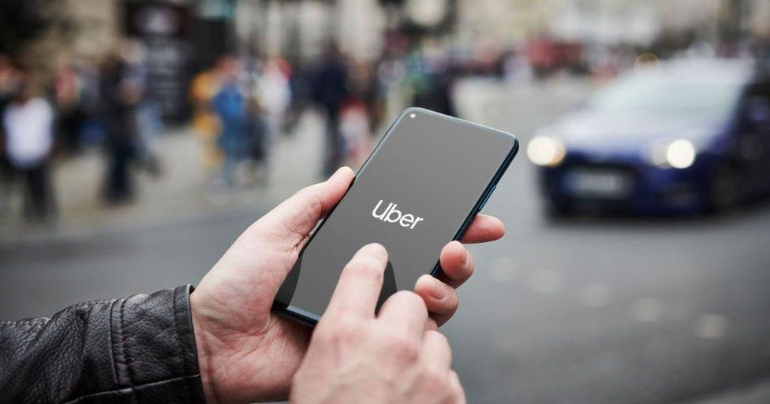Uber says it will give its 70,000 UK drivers a guaranteed minimum wage, holiday pay and pensions.
The ride-hailing app giant said all drivers would earn at least the National Living Wage, which is £8.72 an hour and rises to £8.91 next month.
It comes one month after the US firm lost a legal battle in the UK, begun in 2016, over drivers’ status.
Uber told the BBC it did not expect the change in drivers’ conditions to mean higher fares.
However, analysts said the company increased prices in California after a similar ruling and was likely to do the same in the UK.
Union leaders and employment experts said Uber’s move would have far reaching consequences for the gig economy. Bates Wells lawyer Rachel Mathieson, who represented Uber drivers fighting for worker rights, called it “a very significant milestone”.
In last month’s Supreme Court hearing, Uber had argued it was a third-party booking agent, and its drivers were self employed.
But the court ruled its drivers were workers, a category that means they are entitled to minimum legal, holiday and pension rights.
The company is being challenged by its drivers in multiple countries over whether they should be classed as workers or self-employed.
Workers’ rights
Uber, which has never made a profit, said the changes to its UK drivers’ pay would come in from Wednesday, and form an earnings floor, not an earnings ceiling.
The company said the new rates would come on top of free insurance to cover sickness, injury and maternity and paternity payments which have been in place for all drivers since 2018.
Uber says:
- It will pay at least the National Living Wage for over-25s, irrespective of a driver’s age, after accepting a trip request and after expenses
- All drivers will be paid holiday time based on 12.07% of their earnings, paid out on a fortnightly basis
- Drivers will automatically be enrolled into a pension plan with contributions from Uber alongside driver contributions, setting drivers up over the long term
- It will continue free insurance in case of sickness or injury as well as parental payments, which have been in place for all drivers since 2018
- All drivers will retain the freedom to choose if, when and where they drive
Jamie Heywood, regional general manager for Northern Europe at Uber, said: “Uber is just one part of a larger private-hire industry, so we hope that all other operators will join us in improving the quality of work for these important workers who are an essential part of our everyday lives.
“Drivers have consistently told us that they wanted both the flexibility that we provided but also they wanted the benefits and we’ve been struggling to find a way of bringing those two together in a way that work for us and work for drivers,” he said.
Uber pointed out in its statement announcing the changes that a worker is a classification that is unique under UK employment law. Workers are not full-blown employees but are entitled to the minimum wage, holiday pay and a pension.
The company said the recent UK Supreme Court ruling had provided a clearer path forward as to a model that gives drivers the rights of worker status – while continuing to let them work flexibly.
In a long-running legal battle, Uber had finally appealed to the court after losing three earlier rounds. The Supreme Court ruled that Uber had to consider its drivers as “workers” from the time they logged onto the app, until they logged off.
This was a key point because Uber drivers typically spend time waiting for people to book rides on the app, for which they don’t get paid.
Previously, the firm had said that if drivers were found to be workers, then it would only count the time during journeys when a passenger is in the car.
James Farrar and Yaseen Aslam, the two former drivers who sued Uber over worker status, welcomed Tuesday’s announcement, but said the company was still “shortchanging” drivers.
They said the Supreme Court ruling meant drivers should get worker entitlements from when they log-on to log off. Whereas Uber is committing only to these entitlements from the time a trip is accepted to the drop-off.
Uber drivers will “still be short-changed to the tune of 40-50%. Also, it is not acceptable for Uber to unilaterally decide the driver expense base in calculating minimum wage. This must be subject to collective agreement,” they said.
Others pointed out that Uber had said nothing about compensating drivers for past entitlements they had missed out on.
Gig economy impact
Nonetheless, employment experts said the ramifications of Uber’s changes would be felt across the gig economy.
Nigel McCay of law firm Leigh Day, which represented Uber drivers in the recent court battles, told the BBC: “We see so many other operators using this employment model which is questionable.
“And they’ll now see this decision and think: ‘Hang on, if Uber have had to finally give in and accept that the drivers are workers then how long are we going to be able to sustain an argument that our workers shouldn’t be entitled to those rights?'”
Mary Walker, partner and employment lawyer at law firm Gordons, said the additional costs facing the gig economy mean “some businesses will simply be unable to continue trading”. Other firms will be able to restructure, but perhaps with fewer workers, she added.
Union leaders also warned other gig economy firms they would have to change. “This is the end of the road for bogus self employment,” said Mick Rix, general secretary of the GMB union, which has been fighting for employment rights through the courts.
“It’s a shame it took the GMB winning four court battles to make them see sense, but we got there in the end and ultimately that’s a big win for our members. Other gig economy companies should take note,” Mr Rix said.
SOURCE: BBC







Leave a Comment